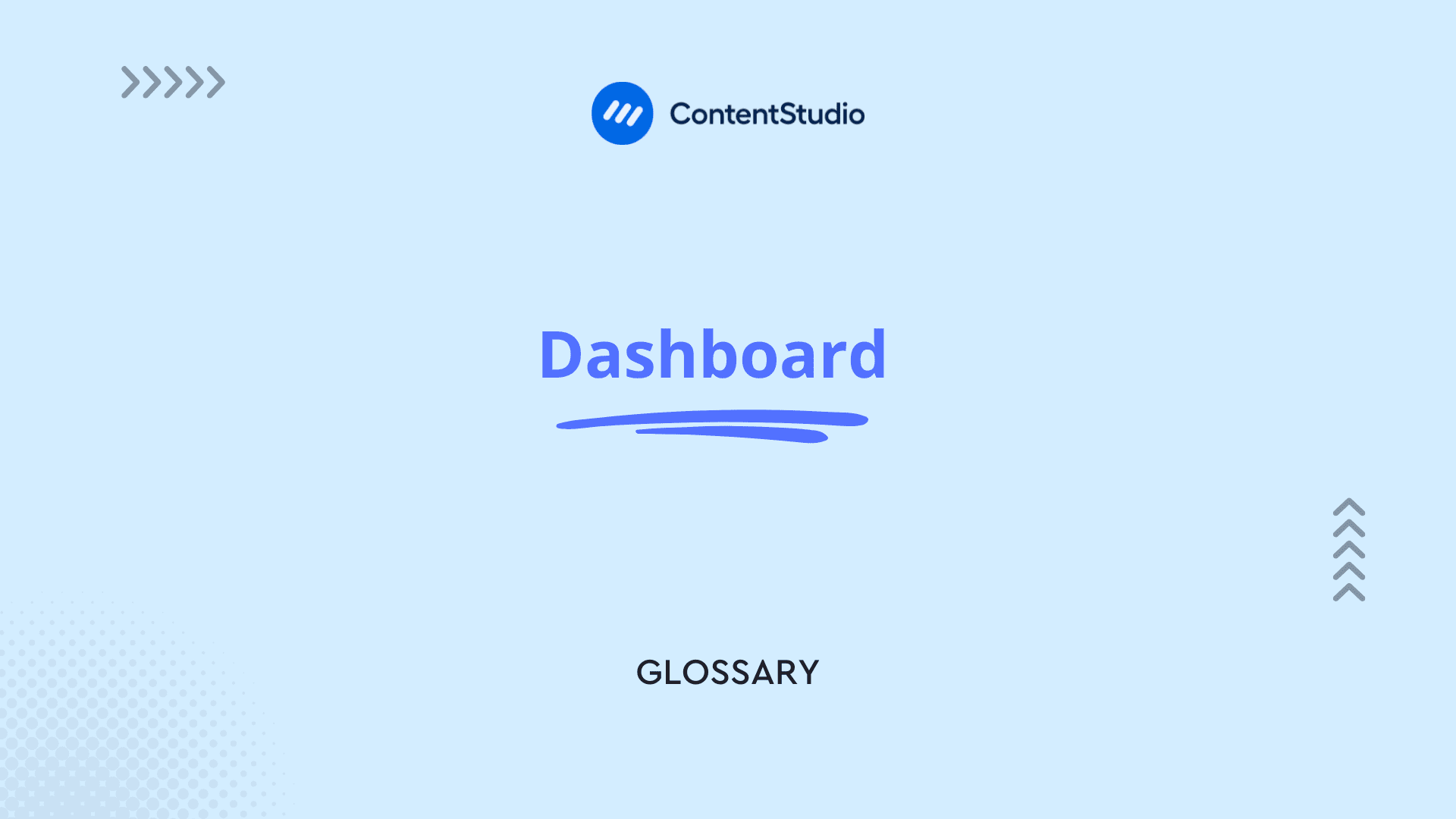Bulk-generate & schedule posts in seconds with Smart Scheduling. Try now!
Dashboard

What is a dashboard?
A dashboard is a centralized visual interface that provides a comprehensive overview of key metrics, data points, and performance indicators in real-time. In the context of digital marketing and social media management, a dashboard serves as a command center where marketers can monitor, analyze, and optimize their online presence across multiple platforms.
Understanding the importance of dashboards in digital marketing
In today's data-driven marketing landscape, dashboards have become indispensable tools for businesses and marketers. They transform complex data sets into digestible visual representations, enabling quick decision-making and strategic planning. When using platforms like ContentStudio's social media analytics and reporting tool, professionals can efficiently track their digital marketing efforts through an intuitive dashboard interface.
Key benefits of using a marketing dashboard
- Centralized data management: A well-designed dashboard consolidates data from multiple sources into a single view. This integration eliminates the need to switch between different platforms and tools, saving valuable time and reducing the risk of overlooking important information. For instance, ContentStudio's unified dashboard brings together content planning, social media management, and performance metrics in one place.
- Real-time monitoring: Dashboards provide up-to-the-minute insights into your marketing performance. This immediate access to data allows marketers to identify trends, spot potential issues, and capitalize on opportunities as they arise. Through social media monitoring, businesses can stay ahead of their competition and maintain a strong online presence.
- Better decision-making: By presenting data in visual formats such as graphs, charts, and heat maps, dashboards make it easier to understand complex information and identify patterns. This visual representation helps in making informed decisions quickly and effectively.
Essential components of an effective dashboard
Performance metrics and KPIs
A comprehensive dashboard should display relevant key performance indicators (KPIs) that align with your business objectives. These might include:
- Engagement rates
- Reach and impressions
- Conversion rates
- Revenue metrics
- Customer satisfaction scores
For social media marketers, tracking platform-specific metrics is crucial. ContentStudio offers detailed analytics for various platforms:
- Facebook analytics for tracking page performance and engagement
- Instagram analytics for monitoring visual content performance
- LinkedIn analytics for measuring professional networking success
- Twitter analytics for evaluating tweet engagement and reach
Customization options
Different users have different needs, so an effective dashboard should offer customization options:
- Adjustable time periods
- Custom metric combinations
- Personalized layouts
- Flexible reporting options
This flexibility ensures that users can focus on the metrics that matter most to their specific goals and objectives. For example, agencies can create custom social media reports tailored to each client's needs.
Advanced dashboard features
Competitive analysis integration
Modern dashboards often include competitive analysis features that allow businesses to benchmark their performance against competitors. ContentStudio provides specialized tools for this purpose:
- Facebook competitor analytics for comparing page performance
- Instagram competitor analytics for monitoring competitor growth and engagement
Automated reporting
Efficient dashboards streamline the reporting process through automation. This feature is particularly valuable for agencies handling client reporting, as it saves time and ensures consistency in reporting formats.
Data visualization and interpretation
Advanced dashboards provide sophisticated visualization options that make data interpretation more intuitive:
- Interactive charts and graphs
- Heat maps
- Trend indicators
- Custom annotations
- Export capabilities
Best practices for dashboard management
Regular monitoring and analysis
To maximize the value of your dashboard:
- Schedule regular review sessions
- Set up automated alerts for important metrics
- Document significant changes and trends
- Share insights with relevant team members
Data accuracy and verification
Ensure dashboard reliability by:
- Regularly checking data sources
- Verifying metric calculations
- Updating integration connections
- Maintaining proper tracking setup
Dashboard optimization
Continuously improve your dashboard by:
- Removing unnecessary metrics
- Adding relevant new data points
- Updating visualization methods
- Adjusting layouts for efficiency
Future trends in dashboard technology
AI and machine learning integration
The future of dashboards lies in artificial intelligence and machine learning capabilities, which will enable:
- Predictive analytics
- Automated insights generation
- Natural language processing for data queries
- Intelligent anomaly detection
Enhanced mobile accessibility
As mobile usage continues to grow, dashboards are evolving to provide better mobile experiences through:
- Responsive designs
- Touch-friendly interfaces
- Mobile-specific features
- Real-time notifications
Advanced customization capabilities
Future dashboard developments will likely include:
- More sophisticated personalization options
- Enhanced data visualization tools
- Improved cross-platform integration
- Advanced automation features
By leveraging comprehensive social media analytics tools and maintaining an organized dashboard, businesses can better understand their digital presence and make data-driven decisions for improved performance.

Create, plan, schedule, and publish posts on all social media networks
Recommended for you


Powerful social media management software
14-day free trial - No credit card required.


